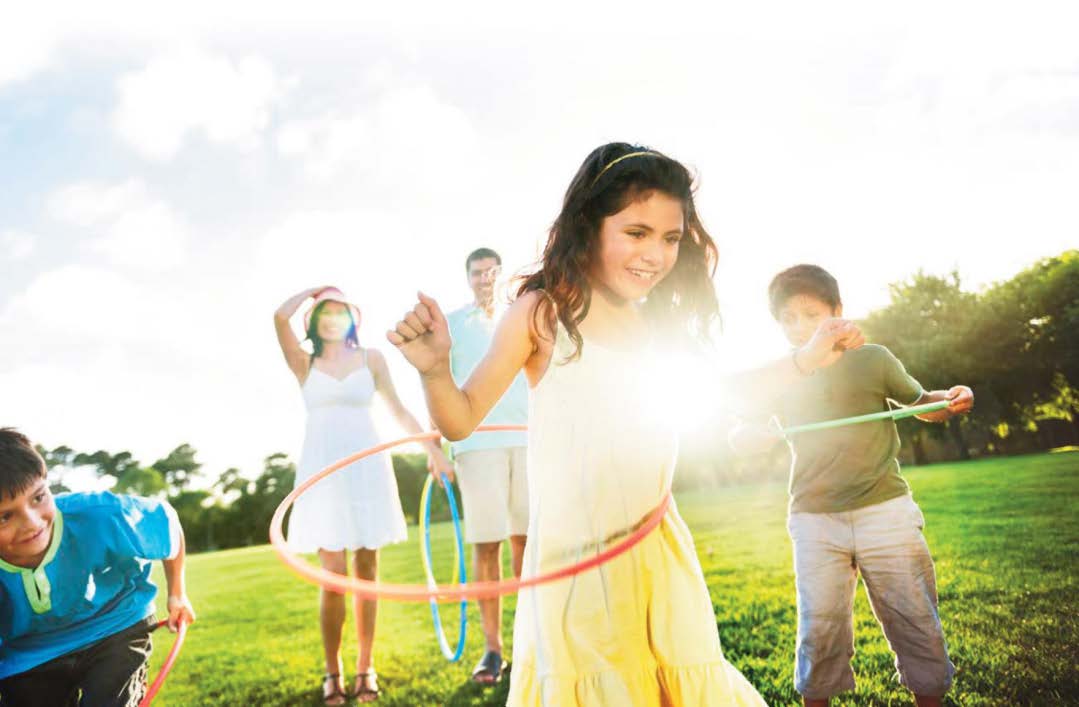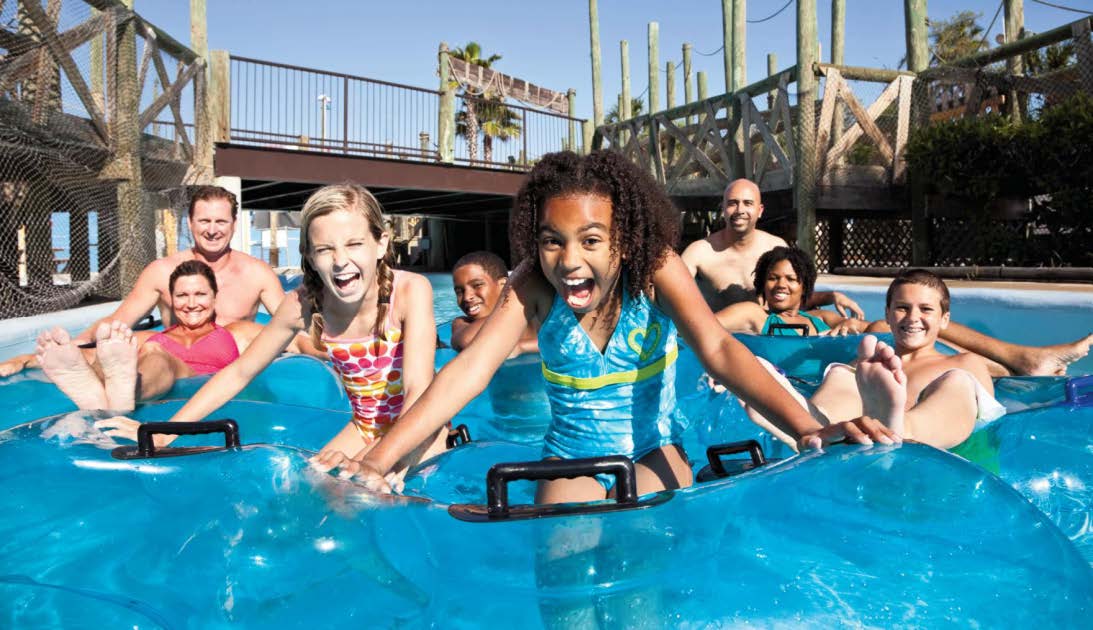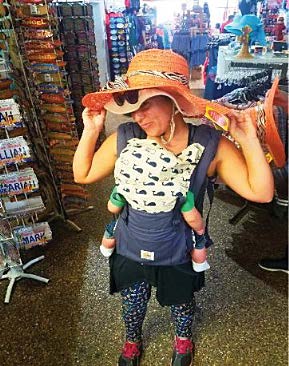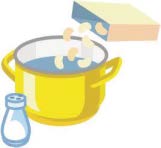IDEAS FOR MILITARY FAMILIES TO CULTIVATE SUMMER LEARNING AND FAMILY CONNECTION
No doubt, once you and your children experience the fun of connecting classroom and kin through activities such as these, your family traditions will broaden and grow across the seasons, as well as across the highways and byways that cover our global nation.
Military families are in the unique situation of being able to travel and explore a multitude of Permanent Change of Station (PCS) locations across the globe. Currently, PCS season is in full swing and opportunities for family adventures abound. Summertime and its promise of warm, sun-lit days is a co-season to PCS time. With the joined advent of these two seasons, families are afforded an exhilarating time to wonder at what lies ahead and reflect upon events that have come before.
W hether you are a military family journeying on the PCS roadway, or one that is revitalizing and revving up for the upcoming school year at your current station, if you have school-age children, you are most likely already considering summer activities to explore and enjoy in the upcoming months to cultivate learning and growth. Those of you on the PCS journey across this great nation are experiencing one of America's traditional approaches toward fortifying family ties and creating shared memories. The great American road trip provides a pathway of prospects for applying classroom learning to active and energetic summer learning in preparation for a new school year. For families enjoying a stretch of time at their existing PCS, balancing indoor air-conditioned family interaction with warm summery outdoor family fun, can keep minds active and scaffold learning across the vast three-month period known as summer vacation. Below are five ideas to help your family connect through plugging in and/or venturing away from electronics this summer.
Some of the mindful tactics presented are designed in accordance with today's new standards, called Common Core State Standards (CCSS), which outline the skills and concepts identified for students to master across the curriculum and provide a uniform set of high standards across the country that allow kids and families to know what the expectation will be when they arrive at their new school (militaryfamily.org/featured-news/common- core.html). According to militaryfamily.org, the uniformity of CCSS, coupled with a flexibility of increasing the challenge based upon student need, ensures that military children receive a high quality education wherever they happen to be stationed. One significant shift of the CCSS is the goal of engaging students and providing deeper understanding of reading and mathematics, rather than simple memorization of facts that are easily lost once a chapter ends and another begins. Through application and deeper understanding, students with learning differences are often afforded opportunities to utilize multiple learning channels which, in turn, promotes long term meaningful learning that can be generalized into the classroom setting come Fall. So whether you are in route to your next PCS destination or already enjoying the summer at your current hometown destination, this is the perfect time to provide authentic application of classroom learning through creative play, active exploration, and the wonder of discovery. No doubt, once you and your children experience the fun of connecting classroom and kin through activities such as these, your family traditions will broaden and grow across the seasons, as well as across the highways and byways that cover our global nation.

FRINGE BENEFITS: Research findings indicate that physical activity and movement are associated with increased attention, decision making, and learning.
1. GET SOME GREEN TIME
Many people enjoy being outside for a portion of their day. In fact, there are even some individuals who suffer from a condition called Seasonal Affect Disorder (SAD), if they do not have enough sunlight. Interestingly, a recent study finds that children with ADHD who routinely spend time outdoors in green settings demonstrate milder symptoms than those who regularly play indoors or even within open-air constructed environments (Science Daily, 9/2011). Moreover, research findings indicate that physical activity and movement are associated with increased attention, decision making, and learning (CHADD/NRC, 5/2018). Take advantage of the summer months to increase your family's fun and provide the benefits of building learning outcomes through outdoor activities at local, regional and state parks, hiking trails, and your own backyard or existing green belts within you PCS community.
• Create chalk art themed events in your neighborhood or on your own patio. Themes provide the perfect scaffold in supporting connection and inference of main ideas.
• Draw a hopscotch on your patio or sidewalk and enjoy a classic game full of hopping, counting, and tossing. Increase math skills through generalizing paper/pencil skills into real life:
➞Provide a yardstick and have your kids create the squares to the specifications agreed upon.
➞ Play the game using only odd or even squares for jumping.
➞ Apply equations such as +3 or -1, to each square when keeping score.
• Create a fun summertime play list, add some hula hooping at a favorite green spot, and enjoy.

GO WITH THE FLOW: Include your children in planning activities, such as visits to an amusement park, to support increased organization, planning, reading, and critical thinking. Your installation's Morale, Welfare, and Recreation (MWR) office offers discount tickets for a range of destinations which can help facilitate learning through travel and new experiences.
• Enjoy some greenery and exercise with a game of jump rope. Introduce your children to old fashioned jump rope rhymes and games. Encourage your kids to research vintage jump rope songs and chants through the library or on the web.
• Stow active footwear in the car for those impromptu moments when you come to a beautiful and serene green location. Take time to chat and connect as a family.
• Sign your child up for an organized sport of their choice this summer. Sit in the stands and cheer your heart out for your child and their team.
• Host an old-fashioned outdoor ice cream social. Invite the neighbors. Decorate the backyard patio using a fun summertime theme.
• Get the kids involved in creating a family water park using sprinklers, small wading pools, and water toys.
2. TRY A STAYCATION
Be a tourist in your own community or within a small hamlet or urban development along the pcs journey. Find fun ways to incorporate skill building and deeper learning into your child's summer by visiting local museums, participating in your library's summer reading program and events, taking a walking tour in the historical district of your town or a neighboring village. Visit a thrift store and discover interesting artifacts of days gone by. Enjoy a car show together. Ask the car owners if they would mind if your kids took a picture of some of their favorite rides. Encourage your child to gather information on a car that interests them, such as make, model, year, and maybe even ask if the car has an interesting or unique history. Take in a local art show or a community theater event. Create and feed the curiosity and creativity of your child and yourself. Seemingly ordinary places, such as a specialized market or a community swap meet, will inspire creative thinkers and develop diverse and flexible citizens.
3. PLAN FAMILY EVENTS
Include your children in planning the activity to support increased organization, planning, reading, and critical thinking. Events can range across a variety of settings to include home, neighborhood, community, across county lines, etc. Start your own neighborhood event, based upon your family's interest. Some great examples of family events:
• Hikes
• Picnics
• Amusement Parks
• Free or low cost community events offered through schools, colleges, libraries, parks, malls, chamber of commerce, churches, and so on.
• Backyard BBQs
• Themed family evenings, with or without guests, to include: music, reading, games, food, singing or dancing, etc.
• Book clubs
4. PLAY GAMES
4. PLAY GAMES The image of a confident and happy child is a parent's dream come true. The simple joy of spending cozy and uninterrupted moments with a beloved parent is one ideal ingredient toward inspiring the growth of self-confidence. Children learn through all their senses, including tasting, touching, seeing, hearing, and even smelling. They also learn language and behavior through watching and imitating what they observe. Play is one of the essential avenues to children's learning; therefore, being engaged in some of the play with your children is essential toward building foundational aspects critical to generalizing learning, to include self-worth, increased concentration, and supporting them in learning how to balance work and play through leisure and creativity. Playing games is one simple and inexpensive way of spending quality time together. Putting together a weekly family board game night is an excellent opportunity for increasing the parent/child connection. family board game night offers an inspirational approach, beyond books and video games, toward nurturing learning skills that will branch out into the classroom including:
• Math Concepts: Number or shape recognition, counting, grouping, and operational vocabulary.
• Reading Concepts: Letter recognition, vocabulary building, and comprehension.
• Foundational Academic Skills: Visual perception, color recognition, categorizing, stamina, prioritizing, problem solving, planning, and goal setting.
• Motor Skills: Eye-hand coordination and dexterity.
• Social Skills: Communication, persistence, personal space, sharing, turn taking, fairness, integrity, ethics, cooperation, and empathy.
Games do not have to be overly academic to be educational. Choosing a game that is appropriate to the ages of each child can be a challenge when faced with incorporating a wide range of ages and/or abilities into family board game night. The task can be managed through differentiating each player's job. Some ideas include: dividing the family into teams; giving a younger child the responsibility of providing the luck by rolling the dice; having an older child organize and sort game pieces. family board game night may be just the spur to progress a child toward independence and social responsibility that creates confident and happy human beings.

YOUR TURN: Family board game night may be just the spur to progress a child toward independence and social responsibility that creates confident and happy human beings.
PCS TIP #2: WORTH A 1,000 WORDS
Reanna, a coastie mom experiencing her 3rd PCS location, suggests a fun and interactive out-of-the box relocation tradition. Reanna shares, "In preparation of the move, after discussing and researching the new region, have the children put together a themed outfit that matches their idea of how life will be in the new region. For example, a PCS relocation to the northwest may encourage the child to choose a whimsical umbrella or a pair of hiking boots." Reanna and her family delight in following up with a family photo shoot, perhaps next to the mode of transport or in a location along the journey. Through such a tradition, skills of inference, documentation within the family PCS scrapbook, and family connection are the outcome.

5. MAKE EVERY DAY AN EDUCATIONAL ONE
Military families are able to acclimate to a wide-variation of environments, ranging from ultra-urban to remote rural localities and everything in between. Beyond the climatic shifts that are often other considerations when determining appropriate apparel, extra-curricular ventures, and mode of transportation. Service men and women are accustom to managing assignments in a variety of hardship duty locations or extreme rural conditions where the technological infrastructure may provide challenge to those who are acquainted with the delights of plugging in to the grid. Even without the ease of handy-dandy hightech devices, today's families can provide opportunities to support increased learning day-to-day. Invite your child to help you with everyday family tasks. Being involved with parents in authentic activities, such as these, builds a can-do attitude, as well as skills in reasoning, planning, and social language that are foundational to increasing access, understanding, and academic learning.Remember to nurture and savor all the moments of this special season of your child's life. Put travel time to good use with enjoyable activities to sow the seeds of reading and oral language skills by including audio books that interest the whole family. Create themed music play lists across various genres and take turns guessing at the theme or main
Remember to nurture and savor all the moments of this special season of your child's life. Put travel time to good use with enjoyable activities to sow the seeds of reading and oral language skills by including audio books that interest the whole family. Create themed music play lists across various genres and take turns guessing at the theme or main
Remember to nurture and savor all the moments of this special season of your child's life. Put travel time to good use with enjoyable activities to sow the seeds of reading and oral language skills by including audio books that interest the whole family. Create themed music play lists across various genres and take turns guessing at the theme or main topic. Listen to the world together and wonder at the sounds and their connection to what is happening and what could happen next. Utilize these engaging activities as a launch pad for family discussions, creative endeavors, and acquiring background knowledge to support increased understanding about social interactions, an upcoming event or critical thinking and problem solving. Remember to pack a healthy picnic lunch and stop at an intriguing location to chat, eat, and rejuvenate along your journey.•
ABOUT THE AUTHOR: Angela Shaw is a special educator who synthesizes her diverse education and experience to collaborate with families and staff, in order to promote success and encourage the students in her care to be life-long learners. Her publishing focus is upon special education topics, as well as military family support. Shaw's son-in-law is an active duty U.S. Coast Guard. Shaw and her husband spend much of their free time adventuring to various PCS locations and enjoying every possible minute with their son-in-law, daughter, and grandson.
GROCERIES
Let your kids help plan the grocery list with you, estimate the total cost, and discover who gets closest to the actual amount. Shopping is a natural task to build and support math problem solving. Pose one, two, or three step questions or compare and contrast purchases. Visual/spatial skills can increase when children are in charge of finding logical space within the cupboard to put groceries away. The sky is the limit. Take a peek at some math word problems within a math book at your child's level and transfer the script to real life events. Have kids chart their chore accomplishments and let them earn monetary, timebased, or other customized rewards. Kids can add up the chart and provide a bill to parents at the end of the time-period mutually agreed upon, along with the chart to show their work.
COOKING
Cook with your children. Let them get involved in the measuring and reading. If needed, simplify or rewrite the instructions for readability and ease of preparation. Cooking and meal preparation provides boundless application to deeper understanding of fractions and mathematical operations of multiplication and division, in addition to supporting math vocabulary and math reasoning. Further benefits are the opportunities to apply and practice following multiple-step directions, vocabulary building and utilizing the text to locate answers and or use reference pages. For example, if a recipe calls for "folding in the berries," your child may need to look up the term "folding" within the appendix or definition section of the cook book. Setting the table requires counting and planning, as well as visual motor and organizational aspects. Children can also stretch their creative wings by crafting their own centerpieces for the table.

LAUNDRY
Sorting laundry provides an explicit application of categorizing, using descriptive vocabulary, and learning colors and textures. Folding laundry provides opportunities to build fine and gross motor that support kids to sit in their chairs, hold a crayon or pencil and write. Putting laundry away supports children in their endeavor to plan and organize their routes with efficiency.
PICKING UP
Planning is a mental process that requires an individual to apply the ability of selecting relevant information and prior knowledge in order to determine a strategy to approach the task, monitor progress, and rethink the strategy if it is not working. Planning is utilized in such academic tasks as decoding words and watching for particular letter patterns; writing a sentence; solving a math word story; as well as so many other facets of learning to include social and academic. Help your child become a master at planning through explicit practice at home. Organizing the family bookshelf or pantry, systematically cleaning up his belongings, or re-designing a common area such as the backyard patio are some ways in which a child can practice making a plan and following through using the required basic mental processes .